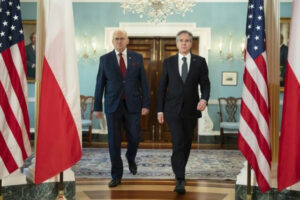 Moon Desk: The United States and Russia again showed they can do business with their second prisoner exchange this year but, despite some suggestions by Moscow, few expect broader diplomacy over the Ukraine war.
Moon Desk: The United States and Russia again showed they can do business with their second prisoner exchange this year but, despite some suggestions by Moscow, few expect broader diplomacy over the Ukraine war.
Working-level US and Russian diplomats met Friday, a day after the swap, in Istanbul but a US official said they discussed a “narrow set of bilateral issues” and not the Ukraine war.
In a scene whose choreography if not personalities were reminiscent of the Cold War, basketball star Brittney Griner, arrested on minor drug charges, walked on the tarmac in Abu Dhabi on Thursday to a plane that took her back to the United States.
Walking in the other direction was Viktor Bout, an arms dealer arrested in a 2008 US sting operation in Thailand, who triumphantly returned home and declared that the West wants to “destroy” Russia.
Still in prison was Paul Whelan, an American accused by Russia of espionage. The former Marine’s detention sparked criticism of President Joe Biden by his Republican rivals, although the administration insisted it was still working to free him.
The Biden administration said that Russia did not budge. But President Vladimir Putin one day later dangled the possibility, saying that further swaps were “possible” with the United States, sparking speculation on which Russians he seeks to free.
“This is the result of negotiations and the search for compromises,” Putin told reporters on a visit to Kyrgyzstan.
He also said on Ukraine that “ultimately, in the end, an agreement will have to be reached” in Ukraine — which he invaded in February, prompting a furious defense backed by Western weapons that has driven back Russian forces.
– ‘Nothing more’ –
The United States and Russia arranged the prisoner exchange through quiet back channels with assistance from the United Arab Emirates.
In April, the two countries carried out a similar deal, swapping Trevor Reed, a former Marine who got into a drunken brawl, for drug-smuggling pilot Konstantin Yaroshenko, with the two swapped in Istanbul.
Turkey, the scene of Friday’s closed-door talks, and the United Arab Emirates both have complicated alliances with the United States and have balked at efforts to isolate Moscow, serving as hubs for Russian expatriates.
Secretary of State Antony Blinken had proposed the prisoner swap involving Griner to his counterpart, Russian Foreign Minister Sergei Lavrov, in a July telephone call, their only known direct conversation since the war.
Blinken said after Griner’s release that the United States was also willing to work with Russia on narrow issues such as arms control but that the swap indicated no wider diplomatic opening.
“This is about getting unjustly detained Americans back to their families,” Blinken told CBS News.
“That was the focus. It’s nothing more. It’s also nothing less.”
Western diplomats privately say it is crucial not to let back-channel diplomacy play into the hands of Putin by making Russia an issue of the United States versus Russia.
Russia alleges it faced a threat from Ukraine’s NATO aspirations. The United States insists that any peace initiative is up to Ukraine, the country that was invaded, and that it will not negotiate over Kyiv’s head.
Will Pomeranz, director of the Wilson Center’s Kennan Institute, said the swap was purely focused on the desires to free prisoners.
“I don’t think this will have any impact really on US-Russia relations. They are in such a terrible, terrible state and I don’t think this really changes the dynamic,” he said.





